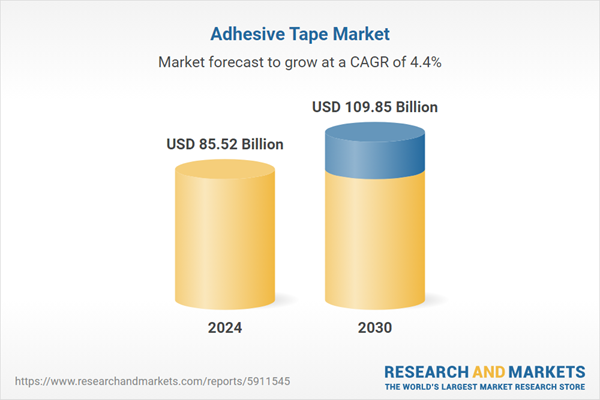Speak directly to the analyst to clarify any post sales queries you may have.
10% Free customizationThis report comes with 10% free customization, enabling you to add data that meets your specific business needs.
Adhesive tapes offer a cost-effective and efficient alternative to traditional fastening methods like screws, bolts, rivets, or welding. They provide several advantages, including faster assembly, improved aesthetics, lower application temperatures, and reduced risk of surface damage. Compared to liquid adhesives, which require more complex application methods such as spraying or rolling, adhesive tapes streamline production processes, especially in automated manufacturing environments, and support lightweight material design.
Key Market Drivers
Growing Demand of Adhesive Tape from Healthcare Industry
Adhesive tapes are integral to the healthcare industry, serving vital roles across a wide range of medical applications. They are commonly used in wound care management to secure dressings, facilitate healing, and prevent infection. In surgical procedures, adhesive tapes help in closing incisions securely, while in routine medical settings, they are essential for stabilizing intravenous (IV) lines and ensuring the continuous and safe administration of medications and fluids. Their versatility and ease of use make them indispensable in both emergency and long-term healthcare scenarios. The demand for adhesive tapes in healthcare has grown significantly in recent years, driven by several key factors.The COVID-19 pandemic highlighted the critical importance of hygiene and infection control, leading to a surge in the use of disposable medical products, including adhesive tapes. The rising prevalence of chronic diseases and an aging global population have increased the need for wound care and long-term treatments, further fueling demand. Global healthcare spending is expected to grow substantially, reaching USD 18.3 trillion by 2040 and accounting for about 12% of global GDP, up from USD 7.2 trillion (10% of GDP) in 2015. This notable increase is driven by factors such as an aging population, escalating healthcare costs, and rising demand for advanced medical technologies and treatments. These trends directly support the growth of the adhesive tape market, particularly in healthcare applications like wound care, surgical procedures, and medical device securing. As healthcare investments rise, so does the demand for reliable, innovative adhesive solutions, fueling market expansion.
Innovation and research & development (R\&D) have played a pivotal role in advancing adhesive tape technologies for healthcare use. Manufacturers are focusing on creating tapes that offer both strong adhesion and enhanced patient comfort. There is a particular emphasis on developing skin-friendly and hypoallergenic solutions suitable for sensitive skin, such as those used on infants or elderly patients. Notably, companies like 3M have introduced silicone-based tapes that combine secure adhesion with the benefit of painless, residue-free removal, reducing the risk of skin damage.
The healthcare sector represents a growing and strategically important segment of the global adhesive tape market. As healthcare systems evolve and patient care standards rise, the demand for advanced adhesive tape solutions will continue to expand. This trend presents significant opportunities for manufacturers to innovate and tailor their products to meet the specific and stringent requirements of medical applications.
Key Market Challenges
Volatility in Cost of Raw Materials
The production of adhesive tapes involves a wide range of raw materials, including adhesives, resins, rubber, and various types of backing materials. Each of these materials contributes to the overall quality and performance of the adhesive tapes.When there are fluctuations in the prices of these raw materials, it directly impacts the manufacturing cost of adhesive tapes. As reported by Industry Arc, the volatility in raw material prices is one of the major challenges faced by the adhesive tapes market. Manufacturers are compelled to adjust their pricing strategies in response to these fluctuations, which can potentially influence consumer buying behavior. There are several factors that contribute to the volatility in the cost of raw materials. Regional supply and demand variations, production outages, currency fluctuations, and even the overall GDP growth of a region can have a significant impact on raw material prices.
Key Market Trends
Growing Demand of Sustainability and Eco-friendly Tapes
Sustainable adhesive tapes, which are made from bio-based or recycled materials, have gained significant popularity due to their reduced environmental impact. These eco-friendly tapes not only offer similar performance to traditional adhesive tapes but also contribute to a significantly lower carbon footprint. In response to the growing demand for sustainable options, manufacturers have been focusing on creating adhesive tapes that are not only environmentally friendly but also easier to recycle. A prime example is tesa, a leading adhesive tape manufacturer, which has developed a range of tapes made from recycled or bio-based materials.The increasing awareness about environmental issues and the harmful effects of plastic waste has been a key driver behind the rising demand for sustainable and eco-friendly adhesive tapes. Consumers and businesses alike are actively seeking greener alternatives, leading to a shift in consumer behavior. Governments worldwide are implementing stricter regulations concerning non-renewable resources and waste management. These regulations are pushing industries, including the adhesive tape market, to adopt more sustainable practices.
The shift towards sustainability is not only impacting the adhesive tape market but also driving manufacturers to invest in research and development (R&D) for creating more eco-friendly adhesive solutions. This trend is not just influencing production processes but also shaping the future of the adhesive tape market. The growing demand for sustainability and eco-friendly tapes is a significant and prevailing trend in the global adhesive tape market. As environmental concerns continue to shape consumer behavior and regulatory landscapes, the focus on developing and promoting sustainable adhesive solutions will only intensify, offering new and exciting opportunities for growth in the adhesive tape market.
Key Market Players
- 3M Company
- Berry Global Inc.
- DuPont de Nemours, Inc.
- HB Fuller Company
- Henkel AG & Co. KGaA
- LINTEC Corporation
- Lohmanh GmbH & Co. KG
- NITTO DENKO CORPORATION
- OJI Holdings Corporation
- Sika AG
Report Scope:
In this report, the Global Adhesive Tape Market has been segmented into the following categories, in addition to the industry trends which have also been detailed below:Adhesive Tape Market, By Resin:
- Acrylic
- Rubber
- Silicone
- Others
Adhesive Tape Market, By Technology:
- Water Based
- Solvent Based
- Hot Melt Based
Adhesive Tape Market, By Application:
- Packaging
- Masking
- Healthcare
- Automotive
- Others
Adhesive Tape Market, By Region:
- North America
- United States
- Canada
- Mexico
- Europe
- France
- United Kingdom
- Italy
- Germany
- Spain
- Asia-Pacific
- China
- India
- Japan
- Australia
- South Korea
- South America
- Brazil
- Argentina
- Colombia
- Middle East & Africa
- South Africa
- Saudi Arabia
- UAE
- Egypt
Competitive Landscape
Company Profiles: Detailed analysis of the major companies present in the Global Adhesive Tape Market.Available Customizations:
With the given market data, the publisher offers customizations according to a company's specific needs. The following customization options are available for the report.Company Information
- Detailed analysis and profiling of additional market players (up to five).
This product will be delivered within 1-3 business days.
Table of Contents
Companies Mentioned
- 3M Company
- Berry Global Inc.
- DuPont de Nemours, Inc.
- HB Fuller Company
- Henkel AG & Co. KGaA
- LINTEC Corporation
- Lohmanh GmbH & Co. KG
- NITTO DENKO CORPORATION
- OJI Holdings Corporation
- Sika AG
Table Information
| Report Attribute | Details |
|---|---|
| No. of Pages | 185 |
| Published | July 2025 |
| Forecast Period | 2024 - 2030 |
| Estimated Market Value ( USD | $ 85.52 Billion |
| Forecasted Market Value ( USD | $ 109.85 Billion |
| Compound Annual Growth Rate | 4.4% |
| Regions Covered | Global |
| No. of Companies Mentioned | 10 |









